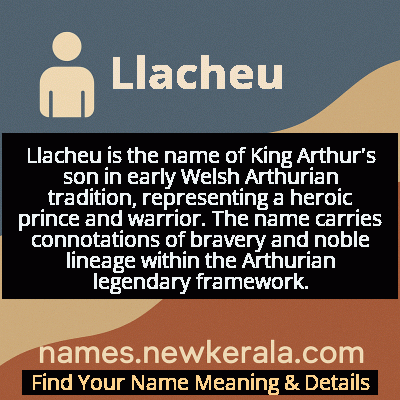Llacheu Name Meaning & Details
Origin, Popularity, Numerology Analysis & Name Meaning of Llacheu
Discover the origin, meaning, and cultural significance of the name LLACHEU. Delve into its historical roots and explore the lasting impact it has had on communities and traditions.
Name
Llacheu
Gender
Male
Origin
Arthurian
Lucky Number
8
Meaning of the Name - Llacheu
Llacheu is the name of King Arthur's son in early Welsh Arthurian tradition, representing a heroic prince and warrior. The name carries connotations of bravery and noble lineage within the Arthurian legendary framework.
Llacheu - Complete Numerology Analysis
Your Numerology Number
Based on Pythagorean Numerology System
Ruling Planet
Saturn
Positive Nature
Ambitious, efficient, realistic, and authoritative.
Negative Traits
Materialistic, stressed, confrontational, and can be overly ambitious.
Lucky Colours
Dark blue, black.
Lucky Days
Saturday.
Lucky Stones
Blue sapphire, amethyst.
Harmony Numbers
2, 4, 6.
Best Suited Professions
Business leaders, managers, financial services, law enforcement.
What People Like About You
Leadership, determination, organizational skills.
Famous People Named Llacheu
Llacheu fab Arthur
Arthurian Knight
Son of King Arthur and Queen Guinevere, celebrated warrior in Welsh tradition
Llacheu of Britain
Legendary Prince
Heir to Camelot throne, mentioned in Welsh Triads and early Arthurian texts
Llacheu ap Arthur
Mythological Hero
Appears in poems like 'Pa Gur' as a formidable warrior in Arthur's war band
Name Variations & International Equivalents
Click on blue names to explore their detailed meanings. Gray names with will be available soon.
Cultural & Historical Significance
In Welsh triads and poems like 'Pa Gur yv y Porthaur?' (What Man is the Gatekeeper?), Llacheu is celebrated as one of Arthur's foremost warriors, fighting alongside other legendary figures like Cei and Bedwyr. His presence in these early texts demonstrates how the Arthurian mythos evolved from Welsh heroic tradition before being adapted into the more familiar French romances where he often appears under the name Loholt. The character's evolution across different cultural traditions reflects the complex transmission and adaptation of Arthurian material throughout medieval Europe.
Extended Personality Analysis
Llacheu is typically characterized by exceptional bravery, martial prowess, and noble bearing befitting a prince of Camelot. As Arthur's son, he embodies the heroic ideals of the Arthurian court—courage in battle, loyalty to his father and comrades, and a strong sense of honor. Early Welsh sources depict him as a formidable warrior who earned his place in Arthur's war band through merit rather than mere birthright.
His personality suggests a young man driven by duty and the weight of his royal inheritance, yet also marked by the vulnerability of youth. The tragic nature of his early death in most traditions adds layers of poignancy to his character, suggesting someone of great potential cut down before fulfilling his destiny. This combination of martial excellence and tragic fate creates a complex figure who represents both the glory and the inevitable sorrow of the Arthurian world, embodying the tension between individual heroism and the cruel workings of fate.
Modern Usage & Popularity
The name Llacheu remains extremely rare in modern times, primarily used by Arthurian enthusiasts, historical fiction authors, and parents deeply interested in Welsh mythology or Arthurian legend. It has never appeared in official baby name statistics in English-speaking countries, making it one of the most obscure Arthurian names in contemporary usage. When used, it typically represents a conscious choice to honor Welsh heritage or Arthurian tradition rather than following naming trends. The name's difficulty of pronunciation for non-Welsh speakers and its complete absence from popular culture have prevented it from gaining any significant modern popularity, existing mainly as a scholarly or niche interest name.
Symbolic & Spiritual Meanings
Llacheu symbolizes the tragic heir—the promising successor whose early death represents the broken continuity of a royal line and the fragility of dynastic dreams. His character embodies the theme of unfulfilled potential, serving as a metaphor for lost futures and what might have been. In Arthurian symbolism, he represents the cost of heroic endeavor and the personal sacrifices behind legendary glory. His early demise in most traditions underscores the transient nature of power and the inevitable decline that follows even the greatest achievements, making him a poignant symbol of the gap between aspiration and reality in the Arthurian world.

